精品2019学年高一英语下学期期末考试试题(新版)新人教版
- 格式:doc
- 大小:397.00 KB
- 文档页数:11
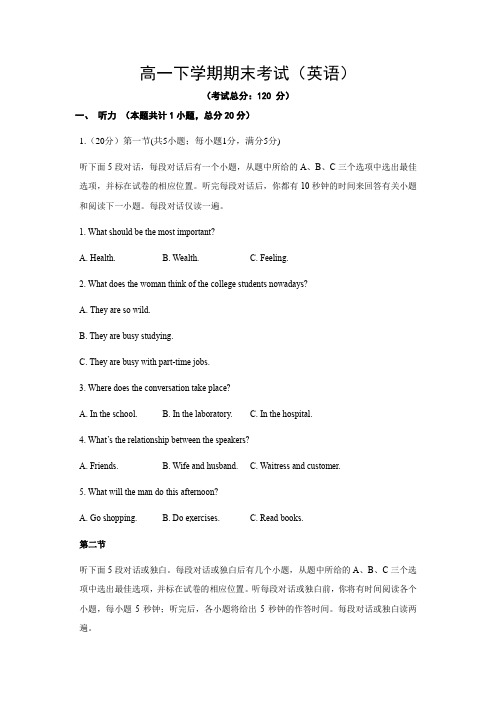
高一下学期期末考试(英语)(考试总分:120 分)一、听力(本题共计1小题,总分20分)1.(20分)第一节(共5小题;每小题1分,满分5分)听下面5段对话,每段对话后有一个小题,从题中所给的A、B、C三个选项中选出最佳选项,并标在试卷的相应位置。
听完每段对话后,你都有10秒钟的时间来回答有关小题和阅读下一小题。
每段对话仅读一遍。
1. What should be the most important?A. Health.B. Wealth.C. Feeling.2. What does the woman think of the college students nowadays?A. They are so wild.B. They are busy studying.C. They are busy with part-time jobs.3. Where does the conversation take place?A. In the school.B. In the laboratory.C. In the hospital.4. What’s the relationship between the speakers?A. Friends.B. Wife and husband.C. Waitress and customer.5. What will the man do this afternoon?A. Go shopping.B. Do exercises.C. Read books.第二节听下面5段对话或独白。
每段对话或独白后有几个小题,从题中所给的A、B、C三个选项中选出最佳选项,并标在试卷的相应位置。
听每段对话或独白前,你将有时间阅读各个小题,每小题5秒钟;听完后,各小题将给出5秒钟的作答时间。
每段对话或独白读两遍。
听第6段材料,回答第6至8题。
6. What event is the man going to enter?A. The long jump.B. The high jump.C. The 100-meter dash.7. What event is the woman going to take?A. The 100-meter dash.B. The high jump.C. The long jump.8. How fast did the woman run the race last time?A. In 10. 5 seconds.B. In 12. 5 seconds.C. In 13. 5 seconds.听第7段材料,回答第9至11题。

宁波市2019学年第二学期期末考试高一英语试卷选择题部分第一部分听力(共两节,满分30分)做题时,先将答案标在试卷上。
录音内容结束后,你将有两分钟的时间将试卷上的答案转涂到答题纸上。
第一节(共5小题;每小题1.5分,满分7.5分)听下面5段对话。
每段对话后有一个小题,从题中所给的A、B、C三个选项中选出最佳选项,并标在试卷的相应位置。
听完每段对话后,你都有10秒钟的时间来回答有关小题和阅读下一小题。
每段对话仅读一遍。
1. Where does the conversation take place?A. In a restaurant.B. In a supermarket.C. In a kitchen.2. Who will probably take the tree away?A. Steve.B. Maggie.C. Jim.3. How is the weather now?A. Rainy.B. Snowy.C. Windy.4. Why does the man seldom wear the shirt?A. It’s too old.B. It doesn’t fit him.C. It has a dark color.5. What are the speakers mainly talking about?A. A holiday.B. The coast.C. A flight.第二节(共15小题;每小题1.5分,满分22.5分)听下面5段对话或独白。
每段对话或独白后有几个小题,从题中所给的A、B、C三个选项中选出最佳选项,并标在试卷的相应位置。
听每段对话或独白前,你将有时间阅读各个小题,每小题5秒钟;听完后,各小题将给出5秒钟的作答时间。
每段对话或独白读两遍。
听下面一段对话,回答第6和7题。
6. Where are the speakers?A. In a store.B. In the man’s house.C. In a restaurant.7. What is in the refrigerator?A. A cup of green tea.B. Large pieces of ice.C. Bottles of water.听下面一段对话,回答第8和9题。

2019-2020学年度第⼆学期期末调研考试⾼⼀英语试题【含答案】2019-2020 学年度第⼆学期期末调研考试⾼⼀英语试题选择题部分第⼀部分听⼒(共两节,满分30分)做题时,先将答案标在试卷上。
录⾳内容结束后,你将有两分钟的时间将试卷上的答案转涂到答题卡上。
第⼀节(共5⼩题;每⼩题1.5分,满分7.5分)听下⾯5段对话。
每段对话后有⼀个⼩题,从题中所给的A、B、C三个选项中选出最佳选项。
听完每段对话后,你都有10秒钟的时间来回答有关⼩题和阅读下⼀⼩题。
每段对话仅读⼀遍。
1.What will Peter do at 10:00 tomorrow?A. Go camping.B. Stay at home.C. Have a meeting.2.How much did the woman pay for the skirt?A. $10.B. $20.C.$40.3.What's the weather like now?A. Cloudy.B. Sunny.C. Rainy.4. When does the supermarket open on the weekend?A.At 6:00 am.B. At8:00 am.C.At 9:00 am.5.What will the woman do for her mother's birthday?A. Buy a gift.B.Throw a party.C.Make a cake.第⼆节(共15⼩题;每⼩题1.5分,满分22.5分)听下⾯5段对话或独⽩。
每段对话或独⽩后有⼏个⼩题,从题中所给A、B、C三个选项中选出最佳选项。
听每段对话或独⽩前,你将有时间阅读各个⼩题,每⼩题5秒钟;听完后,各⼩题将给出5秒钟的作答时间。
每段对话或独⽩读两遍。
听第6段材料,回答第6、7题。
6. Where does the woman want to go?A.The nearest bank.B.The nearest hospital.C.The nearest post office.7. How will the woman go there?A. By bus.B. By car.C. On foot.听第7段材料,回答第8、9题。

唐山一中2019—2020学年第二学期期末考试高一年级英语试卷说明:1.考试时间120分钟,满分150分。
2.将卷Ⅰ答案用2B铅笔涂在答题卡上,将卷Ⅱ答案答在答题纸上。
卷Ⅰ(选择题共100分)第一部分听力(共两节,满分30分)做题时,先将答案标在试卷上。
录音内容结束后,你将有两分钟的时间将试卷上的答案转涂到答题卡上。
第一节:(共5小题;每小题1.5分,满分7.5分)听下面5段对话。
每段对话后有一个小题,从题中所给的A、B、C三个选项中选出最佳选项。
听完每段对话后,你都有10秒钟的时间来回答有关小题和阅读下一小题。
每段对话仅读一遍。
1. Where is the woman from?A. The USA.B. Canada.C. Japan.2. What color dress does the man tell the woman to wear?A. Red.B. Blue.C. Grey.3. What do the speakers decide to do?A. Have dinner late.B. Meet in the man’s office.C. See a movie tonight.4. What are the speakers mainly talking about?A. Some songs.B. Their hobbies.C. A band.5. Why hasn’t the man taken a photo?A. The fog is thick.B. The temple is too far.C. The camera is broken.第二节(共15小题;每小题1.5分,满分22.5分)听下面5段对话或独白。
每段对话或独白后有几个小题,从题中所给的A、B、C三个选项中选出最佳选项,并标在试卷的相应位置。
听每段对话或独白前,你将有时间阅读各个小题,每小题5秒钟;听完后,各小题将给出5秒钟的作答时间。
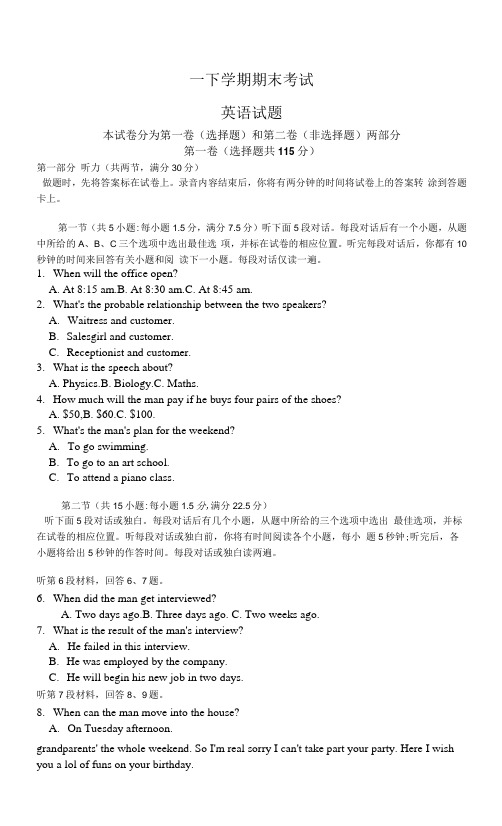
一下学期期末考试英语试题本试卷分为第一卷(选择题)和第二卷(非选择题)两部分第一卷(选择题共115分)第一部分听力(共两节,满分30分)做题时,先将答案标在试卷上。
录音内容结束后,你将有两分钟的时间将试卷上的答案转涂到答题卡上。
第一节(共5小题:每小题1.5分,满分7.5分)听下面5段对话。
每段对话后有一个小题,从题中所给的A、B、C三个选项中选出最佳选项,并标在试卷的相应位置。
听完每段对话后,你都有10秒钟的时间来回答有关小题和阅读下一小题。
每段对话仅读一遍。
1.When will the office open?A. At 8:15 am.B. At 8:30 am.C. At 8:45 am.2.What's the probable relationship between the two speakers?A.Waitress and customer.B.Salesgirl and customer.C.Receptionist and customer.3.What is the speech about?A. Physics.B. Biology.C. Maths.4.How much will the man pay if he buys four pairs of the shoes?A. $50,B. $60.C. $100.5.What's the man's plan for the weekend?A.To go swimming.B.To go to an art school.C.To attend a piano class.第二节(共15小题:每小题1.5分,满分22.5分)听下面5段对话或独白。
每段对话后有几个小题,从题中所给的三个选项中选出最佳选项,并标在试卷的相应位置。
听每段对话或独白前,你将有时间阅读各个小题,每小题5秒钟;听完后,各小题将给出5秒钟的作答时间。
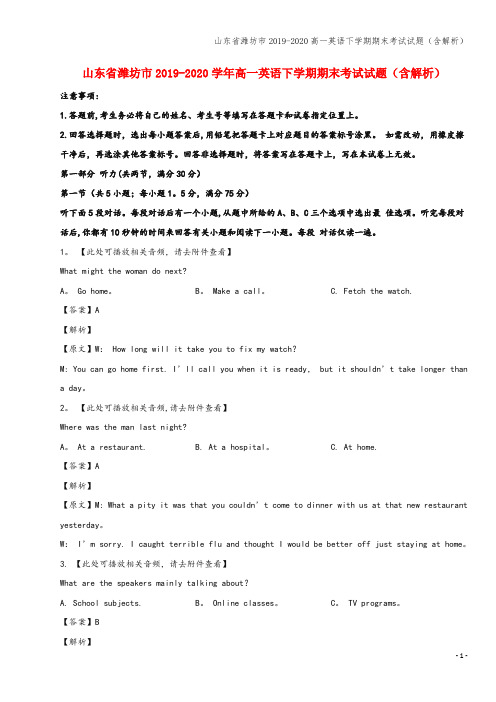
山东省潍坊市2019-2020学年高一英语下学期期末考试试题(含解析)注意事项:1.答题前,考生务必将自己的姓名、考生号等填写在答题卡和试卷指定位置上。
2.回答选择题时,选出每小题答案后,用铅笔把答题卡上对应题目的答案标号涂黑。
如需改动,用橡皮擦干净后,再选涂其他答案标号。
回答非选择题时,将答案写在答题卡上,写在本试卷上无效。
第一部分听力(共两节,满分30分)第一节(共5小题;每小题1。
5分,满分75分)听下面5段对话。
每段对话后有一个小题,从题中所给的A、B、C三个选项中选出最佳选项。
听完每段对话后,你都有10秒钟的时间来回答有关小题和阅读下一小题。
每段对话仅读一遍。
1。
【此处可播放相关音频,请去附件查看】What might the woman do next?A。
Go home。
B。
Make a call。
C. Fetch the watch.【答案】A【解析】【原文】W: How long will it take you to fix my watch?M: You can go home first. I’ll call you when it is r eady,but it shouldn’t take longer than a day。
2。
【此处可播放相关音频,请去附件查看】Where was the man last night?A。
At a restaurant. B. At a hospital。
C. At home.【答案】A【解析】【原文】M: What a pity it was that you couldn’t come to dinner with us at that new restaurant yesterday。
W:I’m sorry. I caught terrible flu and thought I would be better off just staying at home。
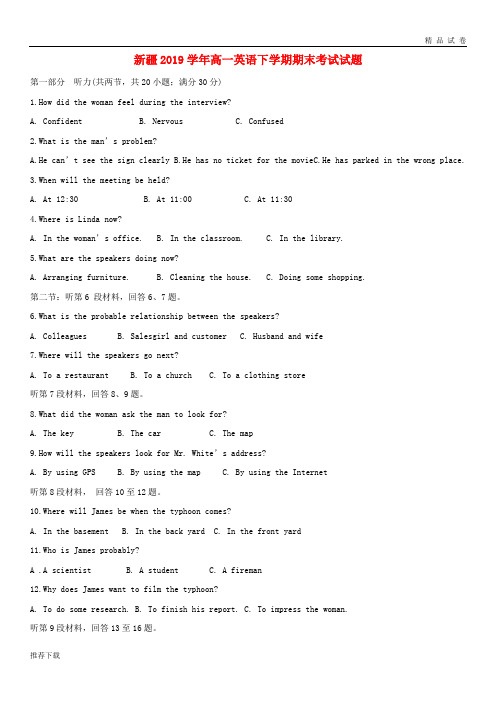
新疆2019学年高一英语下学期期末考试试题第一部分听力(共两节,共20小题;满分30分)1.How did the woman feel during the interview?A. ConfidentB. NervousC. Confused2.What is the man’s problem?A.He can’t see the sign clearlyB.He has no ticket for the movieC.He has parked in the wrong place.3.When will the meeting be held?A. At 12:30B. At 11:00C. At 11:304.Where is Linda now?A. In the woman’s office.B. In the classroom.C. In the library.5.What are the speakers doing now?A. Arranging furniture.B. Cleaning the house.C. Doing some shopping.第二节:听第6 段材料,回答6、7题。
6.What is the probable relationship between the speakers?A. ColleaguesB. Salesgirl and customerC. Husband and wife7.Where will the speakers go next?A. To a restaurantB. To a churchC. To a clothing store听第7段材料,回答8、9题。
8.What did the woman ask the man to look for?A. The keyB. The carC. The map9.How will the speakers look for Mr. White’s address?A. By using GPSB. By using the mapC. By using the Internet听第8段材料,回答10至12题。
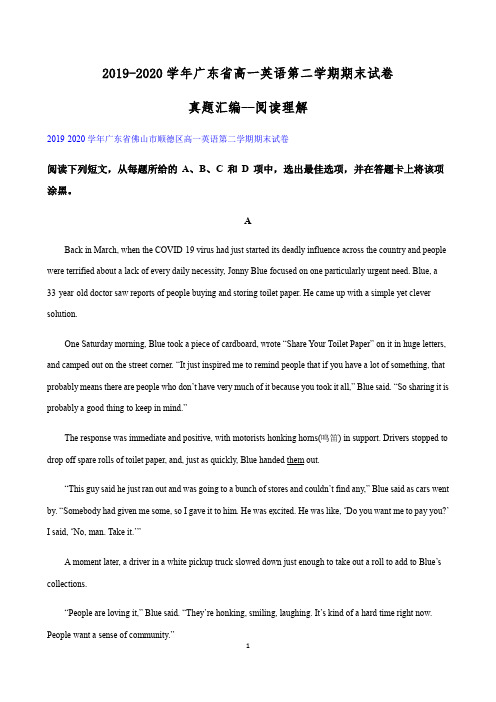
2019-2020学年广东省高一英语第二学期期末试卷真题汇编--阅读理解2019-2020学年广东省佛山市顺德区高一英语第二学期期末试卷阅读下列短文,从每题所给的A、B、C 和D 项中,选出最佳选项,并在答题卡上将该项涂黑。
ABack in March, when the COVID-19 virus had just started its deadly influence across the country and people were terrified about a lack of every daily necessity, Jonny Blue focused on one particularly urgent need. Blue, a 33-year-old doctor saw reports of people buying and storing toilet paper. He came up with a simple yet clever solution.One Saturday morning, Blue took a piece of cardboard, wrote “Share Your Toilet Paper” on it in huge letters, and camped out on the street corner. “It just inspired me to remind people that if you have a lot of something, that probably means there are people who don’t have very much of it because you took it all,” Blue said. “So sharing it is probably a good thing to keep in mind.”The response was immediate and positive, with motorists honking horns(鸣笛) in support. Drivers stopped to drop off spare rolls of toilet paper, and, just as quickly, Blue handed them out.“This guy said he just ran out and was going to a bunch of stores and couldn’t find any,” Blue said as cars went by. “Somebody had given me some, so I gave it to him. He was excited. He was like, ‘Do you want me to pay you?’ I said, ‘No, man. Take it.’”A moment later, a driver in a white pickup truck slowed down just enough to take out a roll to add to Blue’s collections.“People are loving it,” Blue said. “They’re honking, smiling, laughing. It’s kind of a hard time right now. People want a sense of community.”1. What were people worried about at the beginning of the COVID-19 virus?A. Unfriendly neighbors.B. Expensive toilet paper.C. Lack of medical support.D. Not enough daily necessities.2. What is the purpose of Blue’s action?A. To stop buying and storing.B. To encourage toilet paper sharing.C. To advise people to save toilet paper.D. To help people live a healthy lifestyle.3. What does the underlined word “them” in paragraph 3 refer to ?A. Drivers.B. Letters.C. Motorists.D. Rolls of toilet paper.4. Which of the following best describes Blue?A. Professional.B. Humorous.C. Warm-hearted.D. Outgoing.5. What can be a best title for the text?A. The Toilet Paper SharingB. Lack of Daily NecessitiesC. Influences of COVID-19D. Useful Advice from a Doctor【答案】1. D 2. B 3. D 4. C 5. ABJeremy grew up being active in sports. But he never thought about healthy eating until he found himself gaining weight several years after college. Last week, Jeremy hit a turning point when he found that he was too out of shape to play in a company football team. He decided to change his eating habits.The first step Jeremy took toward healthy eating was to stop going to fast-food restaurants. Jeremy used to eat fast food as often as 4 times a week. To his surprise, he found that giving up fast food wasn’t that difficult. Now, he says, “I don’t even like it anymore.” When Jeremy does go out to eat, he tries to pick menu items that he knows arehealthier. He orders salads and lower-fat sandwiches instead of hamburgers, and he drinks water instead of soda pop. “I try to order things that are already prepared the way I would like them to be prepared.”Planning meals has been a key to Jeremy’s success. It helps him avoid getting too hungry and eating fast food. Each week he plans what he will eat for each meal, and he shops for groceries (食品杂货) with his plan in mind. “It’s a lot easier to make healthy choices when you’re just planning ahead for it.” Rather than cutting out certain foods, Jeremy sometimes includes his favourite foods in his eating plan. “That way I don’t feel like I’m letting myself down by not sticking to my plan.”Jeremy’s friends and family noticed when he started eating healthier. They have helped him to make a habit of his healthy eating changes. “It made me feel pretty good, especially when people started making comments about the changes I was making,” he says. “You just get the positive energy.”6. What made Jeremy decide to change his eating habits?A. Higher food prices.B. Weight gain in college .C. Dislike of unhealthy foods.D. Failing to join a football team.7. What did Jeremy think of giving up fast food?A. It was too easy for him.B. It made him uncomfortable.C. It was not as difficult as he thought.D. It meant stopping going out to eat.8. What played the most important role in Jeremy’s healthy eating?A. Eating less at mealtimes.B. Making plans ahead of time.C. Following his friends’ advice.D. Cutting out all unhealthy foods.9. How does Jeremy feel about people’s comments?A. Surprised.B. EncouragedC. Worried.D. Interested.10. In which section of a newspaper may this text appear?A. Health.B. Science.C. Education.D. Entertainment.【答案】6. D 7. C 8. B 9. B 10. ACJose Adolfo is a banker from Peru. He encourages children to save money and offers his customers cash for recycling plastic wastes. But the remarkable thing is that he is still a child himself.By the age of 7, he decided to create a bank for children. He was motivated by seeing his classmates skipping lunch because they had spent the little money they had on sweets or football cards. What drove him even more was the poverty he saw among children.With the support of a local company, the 14-year-old founded the Bartselana student bank which now has more than 2,000 customers between the ages of 10 and 18. Children can withdraw (提取) money from several cashpoints of the bank. They can also monitor their balances online. What makes it different from traditional banks is that it sets savings goals for children. They have to reach those goals in order to withdraw their money.The student bank really took off when he came up with the “Recycle Plan”, a new way for the children to earn money by collecting recyclable plastic or paper waste. Students can bring recyclable plastic bottles, used school books and old newspapers to the schools and put them into the collecting boxes. The recycling is weighed and the money goes to their bank accounts.The bank recycles 4.4 tons of material a month and has collecting boxes in seven schools in Arequipa. More are on a waiting list. Increasingly the model is in demand in the rest of Peru and abroad.His efforts have been noticed by Peru’s environment ministry. “He’s making an amazing change in financial (理财的) education that perhaps many adults could not come up with,” said the Peru’s environment minister, Lucia Ruiz. “He’s achieving a double goal because he’s not just designing a financial opportunity for children and teenagers but also helping to reduce waste in the country.”11. Why did Jose create a bank for children?A. To help poor children.B. To provide free lunch.C. To offer outdoor activities.D. To improve school condition.12. What is special about the student bank ?A. It makes saving goals.B. It monitors the balance.C. It has several cashpoints.D. It serves customers online.13. According to paragraph 4, students can earn money by _______ . .A. using less plastic bottlesB. using old school booksC. collecting plastic wastesD. cleaning collecting boxes14. What can we know about the “Recycle Plan” ?A. It’s typical.B. It’s successful.C. It’s risky.D. It’s well-organized .15. According to Lucia Ruiz, why is Jose’s job meaningful?A He gave money to poor children.B. He taught children how to spend money.C. He helped adults receive financial education.D. He contributed to financial education and recycling.【答案】11. A 12. A 13. C 14. B 15. D2019-2020学年广东省惠州市高一英语第二学期期末试卷第一节阅读下列短文,从每题所给的A、B、C和D四个选项中,选出最佳选项。
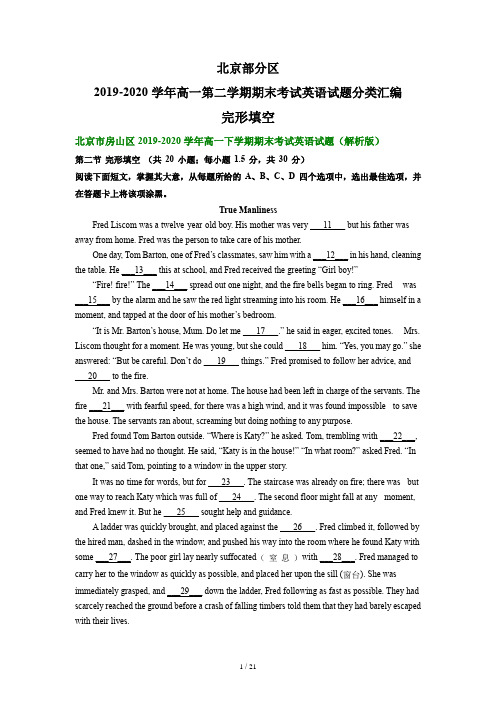
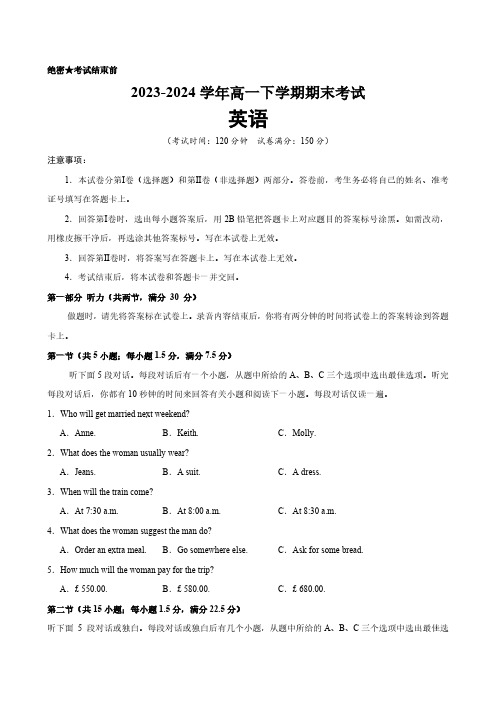
绝密★考试结束前2023-2024学年高一下学期期末考试英语(考试时间:120分钟试卷满分:150分)注意事项:1.本试卷分第Ⅰ卷(选择题)和第Ⅱ卷(非选择题)两部分。
答卷前,考生务必将自己的姓名、准考证号填写在答题卡上。
2.回答第Ⅰ卷时,选出每小题答案后,用2B铅笔把答题卡上对应题目的答案标号涂黑。
如需改动,用橡皮擦干净后,再选涂其他答案标号。
写在本试卷上无效。
3.回答第Ⅱ卷时,将答案写在答题卡上。
写在本试卷上无效。
4.考试结束后,将本试卷和答题卡一并交回。
第一部分听力(共两节,满分30 分)做题时,请先将答案标在试卷上。
录音内容结束后,你将有两分钟的时间将试卷上的答案转涂到答题卡上。
第一节(共5小题;每小题1.5分,满分7.5分)听下面5段对话。
每段对话后有一个小题,从题中所给的A、B、C三个选项中选出最佳选项。
听完每段对话后,你都有10秒钟的时间来回答有关小题和阅读下一小题。
每段对话仅读一遍。
1.Who will get married next weekend?A.Anne.B.Keith.C.Molly.2.What does the woman usually wear?A.Jeans.B.A suit.C.A dress.3.When will the train come?A.At 7:30 a.m.B.At 8:00 a.m.C.At 8:30 a.m.4.What does the woman suggest the man do?A.Order an extra meal.B.Go somewhere else.C.Ask for some bread.5.How much will the woman pay for the trip?A.£ 550.00.B.£ 580.00.C.£ 680.00.第二节(共15小题;每小题1.5分,满分22.5分)听下面 5 段对话或独白。

期末复习(四)一、单选题(共12题;共12分)1.I requested that you ________ the task on time.A. finishedB. finishC. could finishD. would finish2.—Whenever you want a good meal, come to my restaurant and eat for free.—Believe me. That is an ________ I will not refuse.A. approachB. offerC. ideaD. instruction3.Judging by her ________, Jane must be a southerner.A. pronunciationB. accentC. voiceD. sound4.As soon as he heard the news, a(n)________ of surprise appeared on his face.A. conditionB. situationC. factD. expression5.— Why did your brother look so down?His ________ to become a pilot was held back by his poor eyesight.A. promotionB. destinationC. instructionD. ambition6.Tu Youyou was given the Nobel Prize in Physiology or Medicine of 2019 due to her ________ to discovering a new drug to treat parasitic diseases.A. conservationB. expectationC. commitmentD. appreciation7.Of these two basketball teams,the former comes from the US; the ______ comes from England.A. lateB. laterC. latterD. lately8.The sports meeting is _____. We are doing what we can to prepare for it.A. in the wayB. drawingC. this wayD. approaching9.—I'm afraid I'll fail in the exam.— ________. It won't be so bad.A. Don't be afraidB. It doesn't matterC. Take it easyD. You'll not fail10.—I'm feeling terrible. I feel pain here and there.—Oh. . Nothing seriously.A. Go slowlyB. Take it easyC. Stay longerD. See you11.The reason ______ I didn't go to Shanghai was ______ I got a new job.A. why; becauseB. why; thatC. that; becauseD. that; that12.People have the belief ____ factories should produce fewer things from raw materials, ____ the supply is growing smaller and smaller.A. which; thatB. that; of whichC. that; whoseD. which; whose二、阅读理解(共4题;共32分)AHe wishes the holiday season would end already. His back aches, his red suit feels like a spacesuit, his cheeks have gone tight from smiling for 12 hours—and still the kids keep coming and coming, like ants at a picnic. As Christmas becomes more commercialized (商业化) across the U. S. and Canada, so must Santa Claus. As the holiday begins earlier each year, so must its spokesmen.The questions from children these days are harder than ever. Now, with thousands of children expecting a father or mothers erving in Iraq or Afghanistan, the questions are as heartbreaking as they are unanswerable. For example, “Can you please bri ng Daddy home from the war in time for Christmas morning?”Santa Claus; also have a pretty good chance of getting sued (指控). A professional Santa Claus in Canada told a story: A Santa had a girl on his knee, and he commented, “You have nice eyes and nice hair.” The girl later said it was sexual harassment (骚扰). When a Santa feels anxious, he often shows it in the same ways ordinary people do. The Santa Claus were always seen to hang around at the dinner table when the show ended. Many of them just sleep in bed for several days and don't see other children again.13.In the first paragraph,“spokesmen” refers to ______.A. businessmenB. political leadersC. organizers of the activitiesD. Santa Clauses14.The passage implies that the job of Santa Claus is ________.A. well-paidB. very hardC. worth doingD. dangerous15.According to the third paragraph, Santa Claus may sometimes be blamed for ________.A. doing something against the lawB. hanging around the dinner tableC. being lazy and sleeping in bed for daysD. not playing their roles as expected16.What would be the best title for the passage?A. Christmas: Not a Good Festival for Santa ClausB. What Does Santa Claus Do for Children?C. Is Santa Claus Really Alive?D. A Christmas StoryBBERLIN---A German woman, fearful that a burglar was trying to break into her second -storey apartment, called police after she heard someone climbing up to her balcony shortly after midnight, police said Thursday. Police discovered the “burglar” was a man carrying flowers and a bottle of wine who turned out to be the woman's boyfriend. But then arrested him on an outstanding reason.“He was trying to surprise her with the flowers and a bottle of wine but it all went wrong,” said Korbach police spokesman Volker Koenig. He said the man jumped down from the balcony and tried to escape but was quickly caught by police.“He gave the police w ho were taking him to jail the bottle of wine as a gesture of thanks for the friendly treatment after the arrest. ” Koenig said.LONDON---A smoker who died after battling emphysema (肺气肿) has had his dying wish granted with the placement of a “SMOKING KILLED ME” sign on his hearse (灵车) and his grave.Albert Whittamore blamed his youthful smoking habit for the lung disease. He said before he died in February that he wanted the sign to serve as a warning to young people about the dangers of tobacco smoking.The sign was designed to look like the health warning on a packet of cigarettes. The printed notice at his grave will be left in place for a week. The hearse carrying his body through the town of Dover 100 miles (160 kilometers) southeast of London and several of the printed signs shown in the windows.17.The man climbing up to the girl's balcony _______A. was actually a wanted thiefB. was put into prison in the endC. thanked the police for setting him freeD. was treated badly by the police18.The best title for the first news item might be “_______.”A. A burglar's loveB. A burglar boyfriendC. Flowers and wineD. Price for being romantic19.The public paid more attention to the smoker because _______.A. he died after smoking for many yearsB. he had the sign put on his hearse and his graveC. he died of a lung disease without any treatmentD. he wanted the sign left on his grave for one day20.Which of the following is NOT true?A. The sign will be printed on the packet of cigarettes.B. The signs were also shown in the windows of the hearse.C. The smoker wanted to tell people how bad it was to smoke.D. The smoker regretted forming the habit of smoking.CResearchers at the University of Kansas say that people can accurately judge 90 percent of a stranger's personality simply by looking at the person's shoes. “Shoes convey useful information about their wearers”, the authors wrote in the new study published in the Journal of Research in Personality.Lead researcher Omri Gillath said the judgments were based on the style, cost, color and condition of someone's shoes. In the study, 63 University of Kansas researchers looked at pictures showing 208 different pairs of shoes worn by the study's participants. Volunteers in the study were photographed in their most commonly worn shoes, and then filled out a personality questionnaire.Some of the results were expected: People with higher incomes most commonly wore expensive shoes, and flashier shoes were typically worn by outgoing people. However,some of the more specific resu lts are strange enough. For example, “practical and functional ''shoes were generally worn by more “pleasant" people, while ankle boots were more linked with “aggressive”personalities. The strangest of all may be that those who wore “uncomfortable looking” shoes tend to have “calm” personalities. And if you have several pairs of new shoes or take extreme care of them, you may suffer from “attachment anxiety", spending lots of time worrying about what other people think of your appearance. There was even a political calculation in the mix with more liberal (主见变革的) types wearing “shabbier and less expensive” shoes.The researchers noted that some people will choose shoe styles to mask their actual personalities, but researchers noted that volunteers were also likely to be unaware that their footwear choices were showing the deep side of their personalities.21.What does this text mainly tell us?A. Shoes Call hide people's real personalities.B. Shoes convey false information about the wearer.C. People's personalities call be judged by their shoes.D. People know little about their personalities.22.Which of the results is beyond people's expectation?A. Wealthy people often wear expensive shoes.B. Pleasant people like wearing uncomfortable shoes.C. Aggressive people are likely to weal" ankle boots.D. Flashier shoes are typically worn by outgoing people.23.People suffering from “attachment anxiety” tend toA. wear strange shoesB. worry about their appearanceC. have a calm characterD. become a political leader24.The author wrote the text in order toA. inform us of a new studyB. introduce a research methodC. teach how to choose shoesD. describe different personalitiesDWhat's more exciting than having a fresh hot pizza delivered to your door? How about having it brought to you by a robot? Thanks to Domino's Robotic Unit or DRU, that just became a reality! On March 8, the three-foot tall robot delivered its first pizza to some lucky residents in Brisbane, Australia.The fully autonomous DRU is the result of a cooperation between Domino's Pizza Australia and Marathon Robotics.The450-pound machine that travels at a maximum speed of 12.4 miles an hour can traverse a distance of up to 12 miles and back, before requiring a battery recharge. LIDAR, a laser-based sensor technology similar to the one used in self-driving cars, enables DRU to detect and avoid obstacles, while traditional sensors, much like those used in vacuum robots ensure its path is safe as it heads to its destination.The robot can fit up to ten pizzas and even has a separate cold area to accommodate drink orders.To access their fond, customers have to enter the unique code provided by the company.This is not only ensures that they pick up the right pizza, but also prevents the pies from getting stolen.Scientists expert additional DRU's to be ready for service in their various Queensland locations within the next six months. But don't expect these super cute robots to replace humans anytime soon. According to Domino's the DRU still needs extensivetesting, which the company believes could take up to two years.And then there is also the issue of regulations.The public use of autonomous vehicles is still banned in most countries.But Don Meij, the CEO and Managing Director of Domi no's Pizza Australia New Zealand Ltd, is not worried.He is “confident that one day DRU will become an integral part of the Domino's family.”25.What's the function of LIDAR?A. keeping DRU free of obstaclesB. Recharging DRU's batteryC. Helping DRU find its destinationD. Protecting DRU from bad weather26.What does the underlined word “accommodate” in Paragraph 3 probably mean?A. HeatB. HoldC. SellD. Show.27.Why does the company provide codes for its customers?A. To fit up more pizzasB. To prevent the pizza being taken by mistakeC. To keep the pizza warmD. To get the pizza paid in time28.What can we infer about the future of DRU?A. It may need some improvementsB. It will replace humans soon.C. It may be banned in AustraliaD. It will soon be applied worldwide三、完形填空(共1题;共20分)The first week is always a bit hard in my writing classes. I'm unfamiliar 29 the students, most of them trying to30 themselves to their new environment. When Jennifer 31 me with a question on the second day, I was 32for the chance to connect at least one name with a face.Her writing wasn't perfect, 33 her effort was. She worked hard and pushed herself to achieve. She was excited to34 , which made me enjoy teaching her. I didn't 35 then how much she would also teach me. One Friday afternoon, Jennifer stopped by after class. She wasn't asking a question 36 a paper I'd returned. 37 , she said quietly: “I didn't attend classes yesterday. I was at the health center the whole day.” I gave her a sideways look, 38 . “It was just a virus (病毒).I'm fine now,” she39 me. Then she was gone.Two nights later, her father called to tell me that Jennifer would be 40 a few classes. She had been in hospital with meningitis (脑膜炎). I heard from him again a few days later, and again after that. Her condition grew 41 . We made trips to the hospital room. I was 42 frightened when I saw the pale, thin and weak girl who, only ten days earlier, had displayed life and warmth in my classroom.A week later, Jennifer herself called me to tell me she was on the road to 43 . “I'll be back to school one day,” she said. “I have no44 that you'll be w ith us.” I told her, 45 tears. I remembered what her father had said in his first phone call: “school 46 everything to Jenny.”Then five weeks later, I walked into my classroom to find Jenny in her seat, 47 . She 48 all of her missed homework, completed with thought and excellence. The strength of her will to overcome shone out of her pale, weak,eighteen-year-old face.29. A. for B. with C. to D. among30. A. concentrate B. adopt C. devote D. adapt31.A. offered B. bothered C. challenged D. approached32.A. thankful B. prepared C. disappointed D. embarrassed33. A. so B. or C. and D. but34.A. receive B. learn C. contact D. give35.A. realize B. argue C. care D. admit36.A. beyond B. about C. to D. with37.A. However B. Instead C. Therefore D. Besides38. A. shy B. excited C. delighted D. astonished39.A. impressed B. supported C. attracted D. comforted40.A. expecting B. producing C. missing D. taking41.A. better B. sicker C. worse D. heavier42.A. hardly B. mainly C. frequently D. truly43.A. recovery B. success C. school D. attitude44. A. idea B. influence C. opinion D. doubt45. A. going back B. fighting back C. leaving back D. running back46.A. shares B. creates C. means D. exchanges47.A. smiling B. crying C. sobbing D. shaking48. A. gave up B. handed in C. left out D. put up四、单词拼法(词汇运用)(共21题;共21分)49.Don't be ________ (欺瞒) by his words; he is always telling a lie.50.It was a very frightening experience and they were very ________ (英勇的).51.It may be said that the teacher has done his very best to ________ (教化) and help him.52.The ________ (宴席) was served by his mother and sisters.53.timely snow promises a good ________ (收成).54.In the evenings, we g________ around the fireplace and talked.55.Our newspaper is a n ________ newspaper, which is popular among all the people.56.Did you g________ weight after you stopped exercising?57.It is my c________ to go for a walk every day before breakfast.58.If you watch carefully, you'll see how the t________ is done.59.Sports could give me a strong and e________ body and a healthy life.60.There are a very l________ number of available seats, so be sure to book your seat as soon as possible.61.Wang Peng stopped worrying and started advertising the ________ (好处) of his food.62.To succeed, we must ________ (结合) talent with working hard.63.You should do some ________ (探讨) before making the final decision.64.I know that too much f________ leads to heart attack and high blood pressure, so I seldom eat meat.65.Do not give the baby meat to eat, because it is not easily d________.66.Good health depends on a b________ diet, proper exercise and enough sleep.67.Ride three to four times a week, you can let the body stay s________.68.I don't feel that school has the right to put cameras inside the children's home and s________ on them.69.Will the clothing give protection against________(extreme) cold?五、任务型阅读(共1题;共5分)Our mood may change suddenly like a storm with lightning and thunderbolts that comes without notice.The good news is that bad moods can leave as suddenly as they have come. Exceptions to this rule of course are cases where there are other problems such as depression or any other mental destruction.How to improve your mood?____70____When you understand that you are not feeling happy but you are in depression or disappointment, then you can use these simple techniques that will be able to change the negative situation and improve your mood ___71_____. Exercises, gymnastics and sports help a lot to achieve a better emotional balance. If you feel that you are in a bad mood, take a hot bath or sauna.____72____ .Watch a movie, read a book or talk to a friend.____73____ . When you leave work or home, go to places that make you happy and calm. This helps to improve your mood. Make relations with happy, optimistic and pleasant people. ____74____ . Positive and optimistic feelings that create positive thinking for the future will help you overcome your bad feelings and defeat your bad mood.When the problem of bad moods, frustration and negative emotions beyond normal situations becomes chronic (长期的), it is important to turn to a specialist for help.A.The relaxation of the muscles will help.B.Change your environment.C.Use physical activity to fight against feelings of depression.D.This can help you improve your mood significantly.E. First you have to learn to recognize when you are in a bad mood.F. There are ways to improve your mood.G. Changes in feelings and mood can happen for various reasons.六、语法填空(共1题;共10分)The pickle (泡菜) jar as far back as I can remember sat on the floor beside the dresser (梳妆台) in my parents' bedroom. When he got ready for bed, Dad would empty his pockets and toss (投掷) his coins into the jar. It seemed that he wasaccustomed_____75___doing such a thing When the jar was filled, I used to ____76____(go) with him and he would take the coins to the bank. “These are for my son's college fund. He'll never work at the mill (磨坊) all his life like me. If he___77_____ (work) like me in the future, he might not have a b right future. Good education can make a difference to people.” He had the coins ______78__ (count) and then he deposited the money in the bank.The years passed, and I finished college and took a job. Sometimes the job makes me tired ____79____(mental) but it is my particular preference. If possible, I will do it permanently in my life. Once, while ___80_____ (visit) my parents, I noticed that the pickle jar in my parents' bedroom was gone. My father thought ____81____ very important for me to receive a good high education. He demanded that I ___82_____ (try) my best to enter a good university.The first Christmas after our daughter Jessica was born, we made an ___83_____(appoint) to visit my parents so we spent the holiday with them. Now our big fam ily consists of five people. When Susan came back into the living room, she said softly, “Look”. To my amazement, there stood the old pickle jar, the bottom already____84____ (cover) with coins. I walked over to the pickle jar, dug down into my pocket, and pulled out a fistful of coins.With the strong emotion choking me, I dropped the coins into the jar. I looked up and saw Dad who was carrying Jessica. Our eyes locked, and I knew he was feeling the same emotions as I felt.期末复习(四)答案解析部分一、单选题1. B【考点】虚拟语气在名词性从句中的运用【解析】【分析】句意:我要求你们按时完成任务。

江西省南昌市2018-2019学年高一下学期期末考试英语试题注意事项:1. 答题前,考生务必将自己的姓名和考试号写在答题卡相应的位置。
2. 全部答案在答题卡上完成,用2B铅笔涂满涂黑,答在试卷上无效。
3. 考试结束后,将答题卡上交。
第一部分听力(共两节,满分30分)第一节(共5小题;每小题1.5分,满分7.5分)听下面5段对话。
每段对话后有一个小题,从题中所给的A、B、C三个选项中选出最佳选项。
听完每段对话后,你都有10秒钟的时间来回答有关小题和阅读下一小题。
每段对话仅读一遍。
1.When will the train leave?A. 3:20B. 3:30.C. 3:50.【答案】C【原文】此题为听力题,解+析略。
2.What will the woman do tonight?A. See a movie.B. Work on a paper.C. Do an experiment. 【答案】B【原文】此题为听力题,解+析略。
3.Where probably are the speakers?A. In a park.B. In a gymnasium.C. In a restaurant. 【答案】A4.How did the girl go to school today?A. By bus.B. By bike.C. On foot.【答案】C【原文】此题为听力题,解+析略。
5.What are the speakers talking about?A. Future plan.B. Language study.C. University courses.【答案】A【原文】此题为听力题,解+析略。
第二节(共15小题;每小题1.5分,满分22.5分)听下面5段对话或独白。
每段对话或独白后有几个小题,从题中所给的A、B、C三个选项中选出最佳选项。
听每段对话或独白前,你将有时间阅读各个小题,每小题5秒钟;听完后,各小题将给出5秒钟的作答时间。
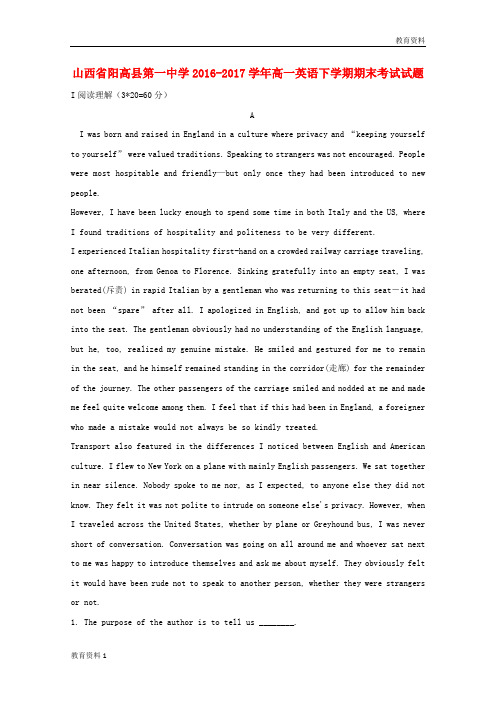
山西省阳高县第一中学2016-2017学年高一英语下学期期末考试试题I阅读理解(3*20=60分)AI was born and raised in England in a culture where privacy and “keeping yourself to yourself” were valued traditions. Speaking to strangers was not encouraged. People were most hospitable and friendly—but only once they had been introduced to new people.However, I have been lucky enough to spend some time in both Italy and the US, where I found traditions of hospitality and politeness to be very different.I experienced Italian hospitality first-hand on a crowded railway carriage traveling, one afternoon, from Genoa to Florence. Sinking gratefully into an empty seat, I was berated(斥责) in rapid Italian by a gentleman who was returning to this seat-it had not been “spare” after all. I apologized in English, and got up to allow him back into the seat. The gentleman obviously had no understanding of the English language, but he, too, realized my genuine mistake. He smiled and gestured for me to remain in the seat, and he himself remained standing in the corridor(走廊) for the remainder of the journey. The other passengers of the carriage smiled and nodded at me and made me feel quite welcome among them. I feel that if this had been in England, a foreigner who made a mistake would not always be so kindly treated.Transport also featured in the differences I noticed between English and American culture. I flew to New York on a plane with mainly English passengers. We sat together in near silence. Nobody spoke to me nor, as I expected, to anyone else they did not know. They felt it was not polite to intrude on someone else's privacy. However, when I traveled across the United States, whether by plane or Greyhound bus, I was never short of conversation. Conversation was going on all around me and whoever sat next to me was happy to introduce themselves and ask me about myself. They obviously felt it would have been rude not to speak to another person, whether they were strangers or not.1. The purpose of the author is to tell us ________.A. his traveling experienceB. cultural differences to show hospitality and politenessC. the culture shock he experienced in Italy and the USD. how to adapt ourselves to a new culture2. What do we know about the passengers of the carriage when the author was traveling in Italy?A. They all laughed at the author for his mistake.B. They were all on the side of the gentleman.C. They would not bear a mistake like the author's in public.D. They all showed their understanding of the author's mistake.3. The author probably believes the Italian people are________.A. coldB. rudeC. hospitableD.helpful4. The last paragraph mainly tells us ________.A. the difference between English and American cultureB. why Americans like to start conversationsC. different attitudes of Englishmen and Americans towards conversationD. the importance of privacy among EnglishmenBTourism probably started in Roman times. Rich Romans visited friends and family who were working in another part of the Roman empire. When the empire broke down, this kind of tourism stopped.In the early 17th century, the idea of the "Grand Tour" was born. Rich young English people sailed across the English Channel. They visited the most beautiful and important European cities of the time, including Paris in France, and Rome and Venice in Italy. Their tours lasted for two to four years, and the tourists stayed a few weeks or months in each city. The "Grand Tour" was an important part of young people's education-but only for the rich.In the 18th century, tourism began to change. For example, people in the UK startedto visit some towns, such as Bath to "take the waters". They believed that the water there was good for their health. So large and expensive hotels were built in these towns.In the 19th century, travel became much more popular and faster. When the first railways were built in the 1820s, it was easier for people to travel between towns, so they started to go for holidays at the seaside. Some started to have holidays in the countryside as cities became larger, noisier and dirtier.Traveling by sea also became faster and safer when the first steamships were built. People began to travel more to faraway countries.The 20th century saw cars become more and more popular among ordinary people. Planes were made larger, so ticket prices dropped and more people used them.Thus tourism grew. In 1949, Russian journalist Vladimir Raitz started a company called Horizon Holidays. The company organizes everything-plane tickets, hotel rooms, even food-and tourists pay for it all before they leave home. The package tour (包办旅行) and modern tourism industry was born.The first travel agency in China was set up as early as 1949. But tourism did not take off until 1978. In 2002, the industry was worth 500 billion yuan and became an important part of China's social development.5. In the early times, the travelers _______ .A. all came from ChinaB. were very young and strongC. had lots of moneyD. traveled by boat6. _______ played the most important role in the tourism development.A. EducationB. MoneyC. TransportationD. People's ideas7. According to the passage , which of the following is right ?A. Money played the most important role in the tourism development .B. In the 20 th century, people preferred traveling by sea to traveling by air.C. China’s tourism did not take off until 1949.D. In 2002 , the tourism industry became an important part of China’s social development.8. Modern tourism industry was born _______A. in 1949B. in Roman timesC. in the early 17th centuryD. in the 19th centuryCWhen my friend Lesa was diagnosed(诊断) with cancer, another friend and I went to the hospital to spend some time with her. We bought her a small toy and named him Lemon-Aide. We gave Lemon-Aide to Lesa and told her he was to go with her to all of her treatments to remind her that we were thinking of her and caring about her even though we could not always be with her. When the treatments were completed, she said when someone else needed him she would pass him along.A few months later,much to my surprise, it was me that she passed him to. Lemon -Aide went with me to all of my treatments.One day while waiting for my doctor I decided we could market the idea to fight cancer. Lesa thought it was a great idea so we founded the organization that came to be known as Lemon-Aide' s Friends, Inc. We designed our organization to remind people fighting cancer that there are people who love and care about them all the time. Today we have totally 5013 volunteers. The money raised is donated to cancer patients who do not have insurance. The physicians on our Board of Advisors determine how and where our money is donated.Lemon-Aide is for men, women, and children of all ages and to date has been sent to 34 states and 33 countries to provide smiling support for people fighting cancer. When life gave us lemons we made Lemon-Aide, a soft smiling toy that represents love, support, and encouragement.9.The author went to the hospital with her friend ________.A.to operate on Lesa B.to treat her diseaseC.to accompany Lesa D.to look after Lemon-Aide10.Lesa was given a small toy because ________.A.he represented her organization B.he could help weaken her painC.she would think of her friends D.her friends tried to comfort her11.It can be inferred that ________.A.the author had suffered from cancerB.Lemon-Aide had suffered from cancerC.Lesa had recovered from cancerD.Lemon-Aide learned to look after the author12.Lesa and the author formed an organization to ________.A.cure cancer B.raise money C.help cancer patients D.help their friendDDo you often feel lonely? What do you do when you feel that way? Hide yourself away and spend your time reading, watching TV or walking around?You might think that feeling lonely is just like feeling happy, sad or scared —that it’s just one of your vari ous moods. That is true. However, if you let yourself be lonely for too long without dealing with it, you could be making a serious mistake.Doctors have known for some time that feeling lonely is bad for the mind. It can lead to mental health problems such as depression, stress and reduce confidence. “Being lonely means not feeling connected or cared for, but it’s not about being mentally alone,” Lisa Jaremka, scientist from Ohio State University, US, told Live Science in January. And there’s growing evide nce that not having friends is connected with physical illness as well.In 2006, for example, scientists studied 2,800 women who had cancer. They found that those who had few friends or family were five times more likely to die of their disease than women with many social contacts. Also, even healthy people had a better chance of falling ill if they felt left out by others, according to the BBC.The results have scientists thinking that loneliness might hurt the immune system(免疫系统), which protects the body from diseases.Hoping to prove this theory, Jaremka and her research team put volunteers(志愿者) through a stress test. During the test, volunteers were asked to make an unprepared speech in front of a group of stony-faced people. The researchers found that volunteers who said they were lonely in their daily lives felt more stress during the test. And their blood samples showed that all the stress had managed to cause harmful changes to their immune system.“Loneliness has been thought of in many ways as a chronic stressor(慢性增压器) — a socially painful situation that can last for quite a long time, ” explained Jaremka, who led the study.The number of people suffering from loneliness is increasing all over the world. However, solving the problem is easier said th an done. It won’t work to just “tell anyone to go out and find someone to love you”, said Jaremka. “We need to create support networks.”13.If people feel lonely for a long time, ________.A. they won’t feel happy anymoreB. they are more mentally harmed than physicallyC. they will find the feeling goes away by itselfD. they are more likely to fall ill14.What was the purpose of the stress test carried out by Jaremka’s team?A. To find out how people fight diseases.B. To prove loneliness hurts people’s i mmune systems.C. To find out the relationship between loneliness and stress.D. To see how people’s emotions change when they give unprepared speeches. 15.We can conclude from the article that ________.A. loneliness has become the No. 1 killer in the worldB. loneliness is increasing due to advanced technologiesC. websites must be set up to help people deal with lonelinessD. much more work needs to be done to fight loneliness第二节(共5小题;每小题3分,满分15分)根据短文内容,从短文后的选项中选出能填A空白处的最佳选项。
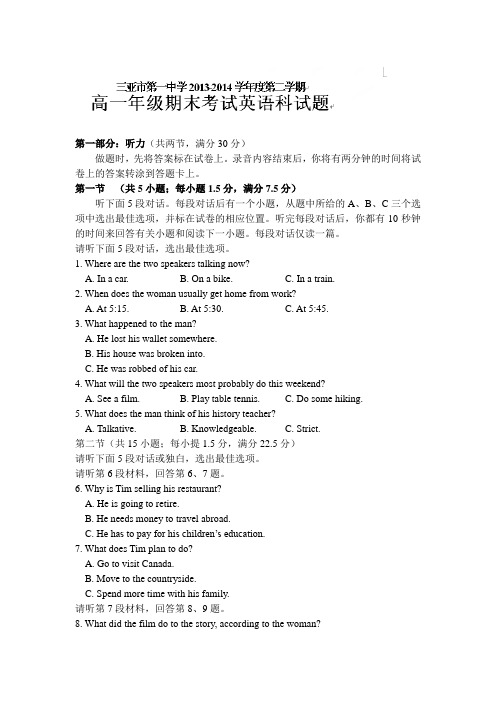
第一部分:听力(共两节,满分30分)做题时,先将答案标在试卷上。
录音内容结束后,你将有两分钟的时间将试卷上的答案转涂到答题卡上。
第一节(共5小题;每小题1.5分,满分7.5分)听下面5段对话。
每段对话后有一个小题,从题中所给的A、B、C三个选项中选出最佳选项,并标在试卷的相应位置。
听完每段对话后,你都有10秒钟的时间来回答有关小题和阅读下一小题。
每段对话仅读一篇。
请听下面5段对话,选出最佳选项。
1. Where are the two speakers talking now?A. In a car.B. On a bike.C. In a train.2. When does the woman usually get home from work?A. At 5:15.B. At 5:30.C. At 5:45.3. What happened to the man?A. He lost his wallet somewhere.B. His house was broken into.C. He was robbed of his car.4. What will the two speakers most probably do this weekend?A. See a film.B. Play table tennis.C. Do some hiking.5. What does the man think of his history teacher?A. Talkative.B. Knowledgeable.C. Strict.第二节(共15小题;每小提1.5分,满分22.5分)请听下面5段对话或独白,选出最佳选项。
请听第6段材料,回答第6、7题。
6. Why is Tim selling his restaurant?A. He is going to retire.B. He needs money to travel abroad.C. He has to pay for his children’s education.7. What does Tim plan to do?A. Go to visit Canada.B. Move to the countryside.C. Spend more time with his family.请听第7段材料,回答第8、9题。

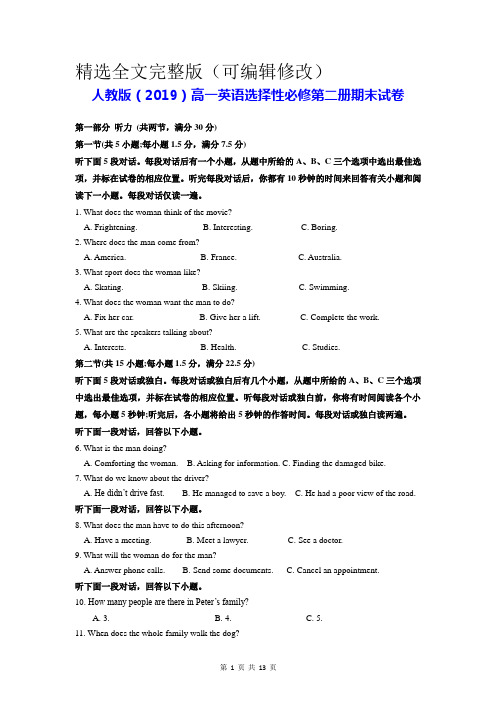
精选全文完整版(可编辑修改)人教版(2019)高一英语选择性必修第二册期末试卷第一部分听力(共两节,满分30分)第一节(共5小题;每小题1.5分,满分7.5分)听下面5段对话。
每段对话后有一个小题,从题中所给的A、B、C三个选项中选出最佳选项,并标在试卷的相应位置。
听完每段对话后,你都有10秒钟的时间来回答有关小题和阅读下一小题。
每段对话仅读一遍。
1. What does the woman think of the movie?A. Frightening.B. Interesting.C. Boring.2. Where does the man come from?A. America.B. France.C. Australia.3. What sport does the woman like?A. Skating.B. Skiing.C. Swimming.4. What does the woman want the man to do?A. Fix her car.B. Give her a lift.C. Complete the work.5. What are the speakers talking about?A. Interests.B. Health.C. Studies.第二节(共15小题;每小题1.5分,满分22.5分)听下面5段对话或独白。
每段对话或独白后有几个小题,从题中所给的A、B、C三个选项中选出最佳选项,并标在试卷的相应位置。
听每段对话或独白前,你将有时间阅读各个小题,每小题5秒钟;听完后,各小题将给出5秒钟的作答时间。
每段对话或独白读两遍。
听下面一段对话,回答以下小题。
6. What is the man doing?A. Comforting the woman.B. Asking for information.C. Finding the damaged bike.7. What do we know about the driver?A. He didn’t drive fast.B. He managed to save a boy.C. He had a poor view of the road. 听下面一段对话,回答以下小题。
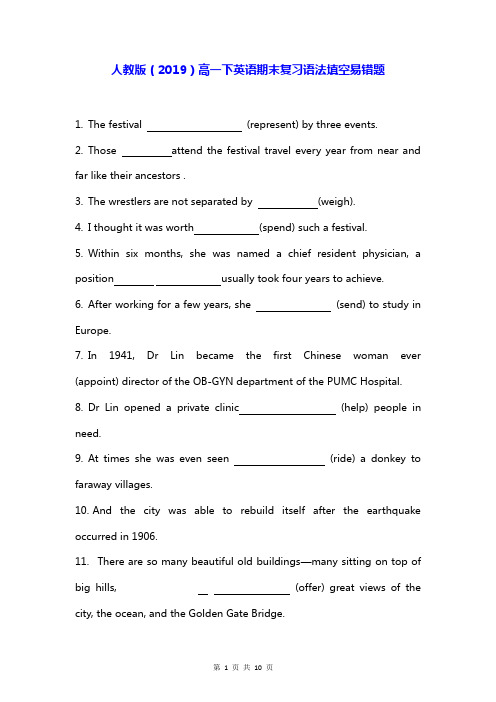
人教版(2019)高一下英语期末复习语法填空易错题1.The festival (represent) by three events.2.Those attend the festival travel every year from near and far like their ancestors .3.The wrestlers are not separated by (weigh).4.I thought it was worth (spend) such a festival.5.Within six months, she was named a chief resident physician, a position usually took four years to achieve.6.After working for a few years, she (send) to study in Europe.7.In 1941, Dr Lin became the first Chinese woman ever (appoint) director of the OB-GYN department of the PUMC Hospital. 8.Dr Lin opened a private clinic (help) people in need.9.At times she was even seen (ride) a donkey to faraway villages.10.And the city was able to rebuild itself after the earthquake occurred in 1906.11.There are so many beautiful old buildings—many sitting on top of big hills, (offer) great views of the city, the ocean, and the Golden Gate Bridge.12.Many of the people (live) here are from Mexico or Central America.13.This district used (be) a poor area of town, but is nowa centre for art, music.14.In fact, an art movement (call) the “Mission School”started here.15.The museum did a really good job of showing how America was built by (immigrant) from different countries and cultures.16.On 4 October 1957, the Sputnik 1 satellite (launch) by the USSR.17.Yuri Gagarin became the first person in the world (go) into space.18.China’s space programme started later than those of Russia and the US, it has made great progress in a short time.19.China became the third country in the world to (independent) send humans into space in 2003, Yang Liwei successfully orbited Earth in the Shenzhou 5 spacecraft.20.Then Shenzhou 6 and 7 completed a second manned orbit and the first Chinese spacewalk, (follow) by the vehicle Jade Rabbit being sent to the moon to study its surface.21.They invited him into their house, Henry told them he (land) in Britain by accident.。

英語試題第一部分聽力(共兩節,滿分30分)第一節(共5小題;每小題1.5分,滿分7.5分)聽下麵5段對話。
每段對話後有一個小題,從題中所給的A、B、C三個選項中選出最佳選項,並標在試卷的相應位置。
聽完每段對話後,你都有10秒鐘的時間來回答有關小題和閱讀下一小題。
每段對話僅讀一遍。
1. When will the concert start?A. At 10:00B. At 10:30.C. At 11:302. Who bought the piano?A. The woman’s fatherB. The man’s fatherC. The woman.3. What does the man mean?A. The car is too expensive.B. The car isn’t of good quality.C. The car is worth its price.4. What’s the relationship between the two speakers?A. Boss and secretary.B. Teacher and studentC. Husband and wife.5. What can we learn from the conversation?A. The woman is a close friend of the man.B. The woman is tired of her work.C. The woman is seeing a doctor第二節(共15小題;每小題1.5分,滿分22.5分)聽下而5段對活或獨白。
每段對話或獨白後有幾個小題,從題中所給的A、B、C三個選項中選出最佳選項,並標在試卷的相應位置。
聽每段對話或獨白你將有時間閱讀各個小題,每小題5秒鐘;聽完後,各小題將給出5秒鐘的作答時間。
每段對話或獨白讀兩遍。
聽第6段材料,回答第6、7題。

英语试题卷 第1页(共8页)2019年下期高2022级期末考试 英 语 本试题卷分第Ⅰ卷(共两部分)和第Ⅱ卷(共三节)。
第I 卷1至7页,第II 卷7-8页,共8页。
考生作答时,须将答案书写在答题卡上,在本试题卷、草稿纸上答题无效。
满分100分。
考试时间115分钟。
考试结束后,交回答题卡。
第Ⅰ卷(共两部分 满分70分) 第一部分 英语知识运用(共两节;满分30分) 第一节 单项选择(共15小题;每小题1分,满分15分) 从A 、B 、C 、D 四个选项中,选出可以填入空白处的最佳选项,并在答题卡上将该项涂黑。
1. Mike likes playing soccer and his sister is fond of playing piano. A. /;the B. the ;/ C. an ;the D. the ;a 2. There _______a teacher and some students in the classroom. A. are B. is C. have D. has 3. The train arrived at the station . A.on time B.in time C.by time D.for time 4.Tom and Paul usually watch TV night. A.in B.at C.for D.on 5. After climbing for two hours, we were glad to take _______ rest. A. ten minute’s B. ten minut es C. ten minutes’s D. ten minutes’ 6. _______ is necessary for students to read English every morning. A. That B. This C. Which D. It 7.The school is the bank the street. A.on,of B.among,and C.between,and D.between,or 8.My brother Sam doesn’t like sports.He plays sports with friends. A.often ually C.never D.always 9.Mr. Zhang goes to work every morning. A.by car B.by a car C.take car D.ride bike 10.My sister always with her friends on Sundays. A.go shopping B.goes shopping C.go to shop D.goes to shop 11.If she here tomorrow,I will call you. A.will come es e D.came 12.--Do you often get online? --Yes,I most of my time on it.It ’s good way to kill time. A.take B.cost C.spend D.pay 13.--Do you like singing songs?--Yes,and I’m crazy Chinese songs.A.onB.inC.aboutD.at14.--Would you like anything to drink?--Just tea.A.a glass ofB.a pair ofC.a piece ofD.a pieces of15.He very busy this week,but he free next week.A.be;isB.is;isC.is;will beD.will be;will be第二节语言应用(共10小题;每小题1.5分,满分15分)Part A 根据下列图片所提供的信息,从16~22题所给的三个选项(A、B、C、D)中,选出最佳选项,并在答题卡上将该项涂黑。
2020届高一年级期末考试英语试卷第I卷(选择题 100分)第一部分听力(共20题,每小题1.5分,共30分)做题时,先将答案标在试卷上。
录音内容结束后,你将有两分钟的时间将试卷上的答案转涂到答题卡上。
第一节(共5小题;每小题1.5分,满分7.5分)听下面5段对话。
每段对话后有一个小题,从题中所给的A、B、C三个选项中选出最佳选项,并标在试卷的相应位置。
听完每段对话后,你都有10秒钟的时间来回答有关小题和阅读下一小题。
每段对话仅读一遍。
例:How much is the shirt?A. £ 19. 15.B. £ 9. 15.C. £ 9. 18.答案是B。
1. Where is the woman from?A. The USA.B. Canada.C. Japan.2. What color dress does the man tell the woman to wear?A. Red.B. Blue.C. Grey.3. What do the speakers decide to do?A. Have dinner late.B. Meet in the man’s office.C. See a movie.4. What are the speakers mainly talking about?A. Some songs.B. Their hobbies.C. A band.5. Why hasn’t the man taken a photo?A. The fog is thick.B. The temple is too far.C. The camera is broken.第二节(共 15 小题;每小题 1.5 分,满分 22.5 分)听下面5段对话或独白。
每段对话或独白后有几个小题,从题中所给的A、B、C三个选项中选出最佳选项,并标在试卷的相应位置。
听每段对话或独白前,你将有时间阅读各个小题,每小题5秒钟;听完后,各小题将给出5秒钟的作答时间。
每段对话或独白读两遍。
听下面一段对话,回答第6和第7两个小题。
6. What did the man do in summer?A. He visited his brother.B. He went swimming.C. He traveled to Italy.7. What is the relationship between the speakers?A. Classmates.B. Teacher and student.C. Guide and tourist.听下面一段对话,回答第8和第9两个小题。
8. What does the man want to do with the trousers at first?A. To exchange them.B. To return th em.C. To repair them.9. When will the man go to a party?A. On Wednesday.B. On Friday.C. On Saturday.听下面一段对话,回答第10至第12三个小题。
10. What will the man do on Saturday night?A. Attend a music festival.B. Visit his friend.C. Invite his friends to dinner.11. What is the woman’s problem?A. Her car has broken down.B. Her boss told her to work at weekends.C. Her sister can’t drive her to the music festival.12. How will the woman go to the music festival?A. By underground.B. By bus.C. By taxi.听下面一段对话,回答第13至第16四个小题。
13. What does the man want to get for Grace at first?A. A cat.B. Pet food.C. Books.14. What does the woman think of shopping online?A. Easy.B. Cheap.C. Interesting.15. What do the speakers decide to buy in the end?A. Sweets.B. Flowers.C. A plant.16. Where are the speakers?A. At home.B. At a pet shop.C. At a bookstore.听下面一段独白,回答第17至第20四个小题。
17.How did the speaker know about the good news?A. From Julie’s mother.B. From a TV programme.C. From Julie’s friends.18. What does the speaker guess Julie is celebrating for?A. A new club.B. Her new novel.C. Her graduation.19. How does the speaker feel about Julie?A. Disappointed.B. Worried.C. Satisfied.20. What did Julie do as a chi ld?A. She won a competition.B. She joined a writing club.C. She gave some lectures.第二部分阅读理解(共两节,满分40分)第一节(共15小题;每小题2分,满分30分)阅读下列短文,从每题所给的四个选项(A、B、C和D)中,选出最佳选项,并在答题卡上将该项涂黑。
AWelcome to Adventureland!Everyone loves Adventureland! The Parks and Exhibitions were built for you to explore, enjoy, and admire their wonders. Every visit will be an unforgettable experience. You will go away enriched, longing to come back. What are you going to do this time?The Travel PavilionExplore places you have never been to before, and experience different ways of life. Visit the Amazon jungle(丛林)village, the Turkish market, the Tai floating market, the Berber mountain house and others. Talk to the people there who will tell you about their lives, and things they make. You can try making a carpet, making nets, fishing…The Future TowerThis exhibition shows how technology will affect our lives. It allows us to look into the future and explore the cities of the next century and the way we’ll be living then. Spend some time in our space station and climb into our simulator(模拟装置)for the Journey to Mars!The Nature ParkThis is not really one park but several. In the Safari Park you can drive among African animals in one of our Range Cruisers: see lions, giraffes, elephants in the wild. Move on to the Ocean Park to watch the dolphins and whales. And then there is still the Aviary to see…The PyramidThis is the center of Adventureland. Run out of film, need some postcards and stamps? For all these things and many more, visit our underground shopping center. Come here for information and ideas too.21. The Travel Pavilion might interest people_______ .A. who like shoppingB. who like huntingC. who want to experience different lifestylesD. who want to live an old-fashionedlifestyle22.The Future Tower is designed to help us____.A.go on a journey to Mars B.explore cities worldwideC.experience effects technology will have on lifeD.learn about the latest technology23. If you are interested in sea creatures, you may visit_____ .A. The Pyramid.B. The Safari ParkC. The Future Tower.D. The Ocean Park.BCompassion(同情心) is a desire within us to help others. With effort, we can translate compassion into actions. An experience last weekend showed me this is true. I work part-time in a supermarket across from a building for the elderly. These old people are our main customers, and it’s n ot hard to lose patience over their slowness. But last Sunday, one aged gentleman appeared to teach me a valuable lesson. This untidy man walked up to my register(收款机)with a box of biscuits. He said he was out of cash, had just moved into his room, and had nothing in his cupboards. He asked if we could let him have the food on trust. He promised to repay me the next day.I couldn’t help staring at him. I wondered what kind of person he had been ten or twenty years before, and what he would be like if luck had gone his way. I had a hurt in my heart for this kind of human soul, all alone in the world. I told him that I was sorry, but store rules didn’t allow me to do so. I fe lt stupid and unkind saying this, but I valued my job.Just then, another man, standing behind the first, spoke up. If anything, he looked more pitiable. “Change it to me. ” was all he said.What I had been feeling was pity. Pity is soft and safe and easy. Compassion, on the other hand, is caring in action. I thanked the second man but told him that was not allowed either. Then I reached into my pocket and paid for the biscuits myself. I reached into my pocket because these two men had reached into my heart and taught me compassion.24. The author lost patience on customers mainly because _________ .A. They were poor and meanB. They were unt idyC. They were old and slowD. They were lonely25. Why did the author refuse the old man?A . he didn’t want to lose his present jobB.he was cold-bloodedC.he thought of the man as poorD.he wanted someone else to pay26. Who finally paid for the the box of biscuits?A. the old man himselfB. the authorC. another customerD. none of them27. According to the last paragraph, which of the following is true about pity and compassion?A. Pity can certainly lead to compassionB. Pity can’t lead to compassion.C. Pity is the feeling while compassion shows in action.D. Pity has nothing to do with compassionCHere is some mustknow information from a handbook on how people behave in doing business in some countries.In BrazilBrazilians are warm and friendly.They often stand close when talking and it is common for them to touch the person on the shoulder.People often greet each other (particularly women) with light cheek kisses.Schedules tend to be flexible,with business meetings sometimes starting later than planned. But to be safe, be on time. Meals can stretch for hours—there's no such thing as rushing a meal in Brazil. Lunches also can start in the mid to late afternoon.Brazilians are social,preferring facetoface communication over emails or phone calls.In SingaporeSingaporeans shake hands when they meet and often also greet each other with a small,polite bow. Business cards should be offered and received with two hands.Arriving late is considered disrespectful.So be on time. Efficiency(效率) is the goal, so meetings and dealings often are fastpaced.Singaporeans are direct in their discussions,even when the subject is about money.Rank is important and authority is respected.This determines how people interact in meetings.For example,people avoid disagreeing outright with someone of a higher rank.In the United Arab EmiratesIn the UAE,status is impor tant, so the most senior or oldest should be greeted first with their titles.The handshake seems to be longer than elsewh ere. So do not pull away from the handshake. Women should cover themselves when it comes to dress.Men also tend to be covered from neck to elbows(肘部) and down to the knees.People do not avoid entertaining in their homes,but they also hold business meals at restaurants.Touching or passing food or eating with your left hand is to be avoided.When meetings are onetoone, if your host offers you coffee,you should refuse.It might seem odd,but it is a cultural tradition.Coffee should only be accepted if it is already set out or presented.In SwitzerlandThe Swiss tend to be formal and address each other by last name.They also are respectful of private lives.You should be careful not to ask about personal topics.Punctuality (守时) is vital,something that comes from a deep respect for others' time. Arrive at any meeting or event a few minutes early to be safe.They also have clear structure in their companies.Higherups make the final decisions,even if others might d isagree.Neat,clean dress is expected.The Swiss follow formal table manners.They also keep their hands visible at the table and their elbows off the table.It is polite to finish the food on your plate.28.The passage is mainly about ________.A.customs and business mannersB.the workplace atmosphereC.lifestyles in different countriesD.living conditions29.Which of the following is true about Brazil?A. Meetings start strictly as plannedB. They like to keep a distance when talkingC. Meals can last for hoursD. People prefer e-mails rather than face-to-face communication30. Why do Singaporeans avoid disagreeing straight with the boss?A. Efficiency is highly valuedB. They don’t like to talk to their bossC. They want to save timeD. To show respect for someone of a higher rank31. In which country do people care about which hand to use when eating?A. in Brazil.B. in Singapore.C. in the United Arab Emirates.D. in Switzerland.DNearly every week, we hear news about the latest successes and failures in driverless vehicles. But we hear little about how other industries are developing this same kind of technology.One industry heavily involved in researching and developing artificial intelligence, or AI, is agriculture. Companies are experimenting with high-tech tools that can help farmers save time and money, while reducing environment-harming chemicals.One of the companies is ecoRobotix of Switzerland. It created a robot equipped with AI and cameras to identify all plants on a farm. The robot has four wheels to carry it through the fields in search of weeds. Computer-controlled arms then lower and spray the weeds with small amounts of chemicals.Company officials say the robot can fully operate on its own for up to 12 hours a day while being powered by the sun. It uses the same kind of sensor and positioning technology used to guide driverless vehicles.A farmer can also control the equipment through a smartphone.The co-founder of ecoRobotix, Aurelien Demaurex, says the farm robot can kill weeds with 20 times less chemicals than traditional methods. This is because the system uses exactly the right amount of chemical in the exact place required to kill the weeds.Currently, farmers spread weed killers over huge areas to destroy unwanted plants.This method led to a huge industry of genetically engineered crop products created to resist chemicals. The process of changing the genetic structure of food crops has been debated for some time. Critics of genetically engineered crops believe they can harm people. Large chemical companies have been criticized for supporting genetic crop engineering in order to keep driving chemicals sales.Aurelien Demaurex says the ecoRobotix system can revolutionize farming by greatly reducing chemical usage, while operating without additional equipment or people. The company is planning to bring its robot to the market by early next year.32.which is closest in meaning to the bold faced word “weeds”_____A. seedsB. cropsC. unwanted plantsD. unwanted seeds33.Which statement is true about the robot created by ecoRobotix?_____A . it will cost farmers more money.B . it can be controlled through smartphones by farmersC.it’s powered by wind energyD.it’s already in wide use34.Why do chemical companies support genetic crop engineering?A.because genetically engineered crop can resist chemicalsB.because genetically engineered crop can grow fastC.because chemical companies want to promote chemical salesD.because chemical companies are not aware of its danger.35.which is probably the best title?A.Smart Farm EquipmentB.Agriculture in the FutureC.Genetic Crop EngineeringD.Artificial Intelligence第二节(共5小题;每小题2分,满分10分)根据短文内容,从短文后的选项中选出能填入空白处的最佳选项,并在答题卡上将该项涂黑。